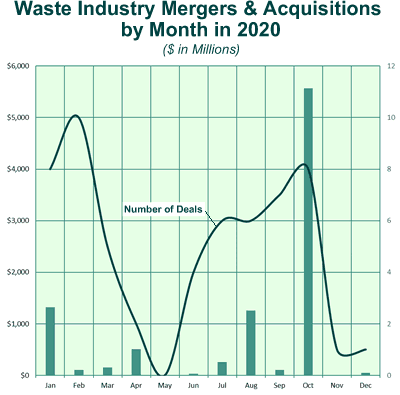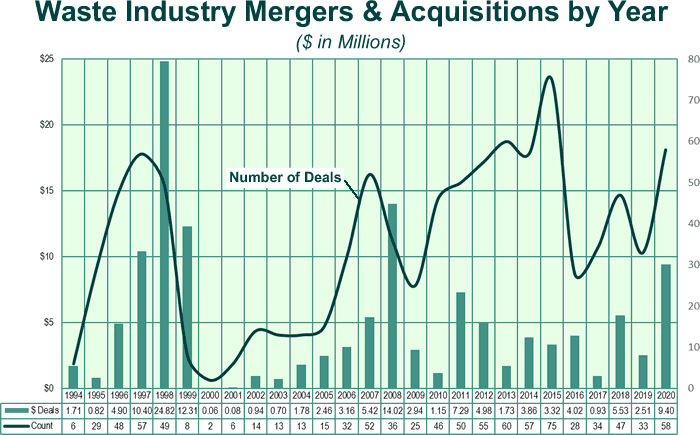Despite All - a Surprisingly Good Year for Mergers and Acquisitions
Date: January 4, 2021
Source: News Room
Despite the significant pressures on all aspects of the economy, including double-digit declines in second quarter GDP caused by the pandemic, merger and acquisition (M&A) activity roared back to life in the third quarter before settling down at year's end. Third quarter transaction values increased by 160 percent compared to the previous quarter and, perhaps more remarkably, by 33 percent year over year. Pent-up demand and the delay in some deals meant to happen earlier, especially as lenders and borrowers waited out the initial market uncertainty, were contributing factors.

The drastic shutdowns that kept workers at home was a double whammy for commercial haulers who suffered sharp declines in commercial volumes, revenue from which is weight-based, while suffering higher disposal costs from the 15-20 percent increases in residential volume, whose pricing contracts are generally fixed. On top of that were new safety challenges to protect workers and customers. Waste firms responded by implementing cost-saving measures, deploying more technology, and looking harder at strategic acquisitions to create economies-of-scale.
Notable Deals
Most notable is Waste Management's (Houston, TX) acquisition of rival Advanced Disposal (Ponte Vedra, FL) for $4.6 billion completed last October. The deal, originally announced in April 2019, faced lengthy delays as the Department of Justice (DOJ) reviewed potential areas where competition could be compromised. It was further delayed as the companies had to reassess the valuation considering DOJ demands and in the wake of the pandemic. GFL Environmental (Vaughan, Ontario), continuing its buying spree following its $1.4 billion IPO in March, bought divestitures of the Waste Management deal valued at $863 million. Those included 32 collection operations, 36 transfer stations, and 18 landfills supported by 380 collection vehicles and numerous hauling routes across 10 states.
Earlier in the year, GFL completed its $480 million acquisition of County Waste of Virginia in January and purchased American Waste for $380 million later that month. In August, the company paid a whopping $1.2 billion for Houston-based WCA Waste.
Other notable deals include Waste Connections' (The Woodlands, TX) acquisition of York, PA-based Penn Waste with annualized revenue of $130 million in January and Republic Services' (Phoenix, AZ) purchase of Santek Waste Services (Cleveland, TN) with $125 million in annual revenue last March.
Analysts agree that Santek, with which operates more than a dozen landfills and 11 transfer stations across nine states is a great fit for Republic, especially as it brings them years of precious additional landfill capacity.
Many other companies made smaller acquisitions in the year including Wheelabrator, Casella Waste Systems, and Meridian Waste Services.

Key Drivers
Key factors driving these acquisitions and further industry consolidation derive from the business being a capital intensive, highly regulated, recession resistant (80 percent of sales are service-based), essential service that generates ample cash flow and benefits from large economies-of-scale. This applies to efficiencies gained from operating larger collection fleets, to building bigger transfer and materials recovery facilities to operating larger landfills. Large landfills can be half as expensive to operate (on a per ton basis) than smaller ones but often require larger vertically integrated collection and processing to feed them.
Precious Landfill Capacity
Another factor is diminishing landfill capacity in the Northeast. More waste exports drive the development of waste-by-rail systems and large destination landfills, both of which are capital intensive and require sophisticated organization. Witness Action Environmental (Interstate Waste)'s recent purchase of the Apex Landfill in Ohio and Macquarie Infrastructure's $590 million purchase of Tunnel Hill Partners, both of which are big waste-by-rail plays.
Room to Grow
And there's room to grow. Non publicly-traded companies account for $17.5 billion (21 percent) of the $76 billion waste industry. Municipalities control another $14.4 billion. Among the private companies there has been a flurry of acquisitions. Those include companies to look out for like Waste Pro, Meridian Waste, Rumpke, and others. It also stands to reason that more municipalities will continue to privatize or contract out waste services, particularly considering the recent challenges posed by recycling.
Potential for More Stringent Regulations
Potential tightening of environmental regulations associated with the ambitious agenda of the incoming administration will likely give an advantage to larger firms that already spend heavily on environmental compliance, have regimented systems and safeguards in place, already exceed environmental requirements, and can spread those costs over a larger enterprise.
New Technologies
The effects of the pandemic, especially in the volatile commodity-driven recycling markets, but also as companies have sought operational improvements on an improved cost-structure has led to the embrace and deployment of new technology across every aspect of the business, from accounting and customer service systems, to self-reporting dumpsters and fleet operations, and the operation of the waste processing and disposal facilities themselves. Technology continues to be capital-intensive and will likely be more so in the future, especially as companies embrace potential emergence of disruptive recycling or waste-to-energy technology, electric vehicles, and the like. This too creates economies-of-scale likely to drive further consolidation.
Niche Waste Sectors
Niche sectors of the waste industry such as liquid wastes, energy sector byproducts, and nonhazardous and hazardous waste streams emanating from the utility, industrial and infrastructure markets are also expected to draw investor and M&A activity as companies seek further consolidation in some still fragmented markets. Examples this year include Veolia North America's $250 million purchase of a hazardous waste facility from Alcoa Corp. in January and Harsco's $463 million purchase of Stericycle's domestic environmental solutions business in April. Other key players include Clean Harbors, Covanta, EnergySolutions, US Ecology, and others.
Sign up to receive our free Weekly News Bulletin